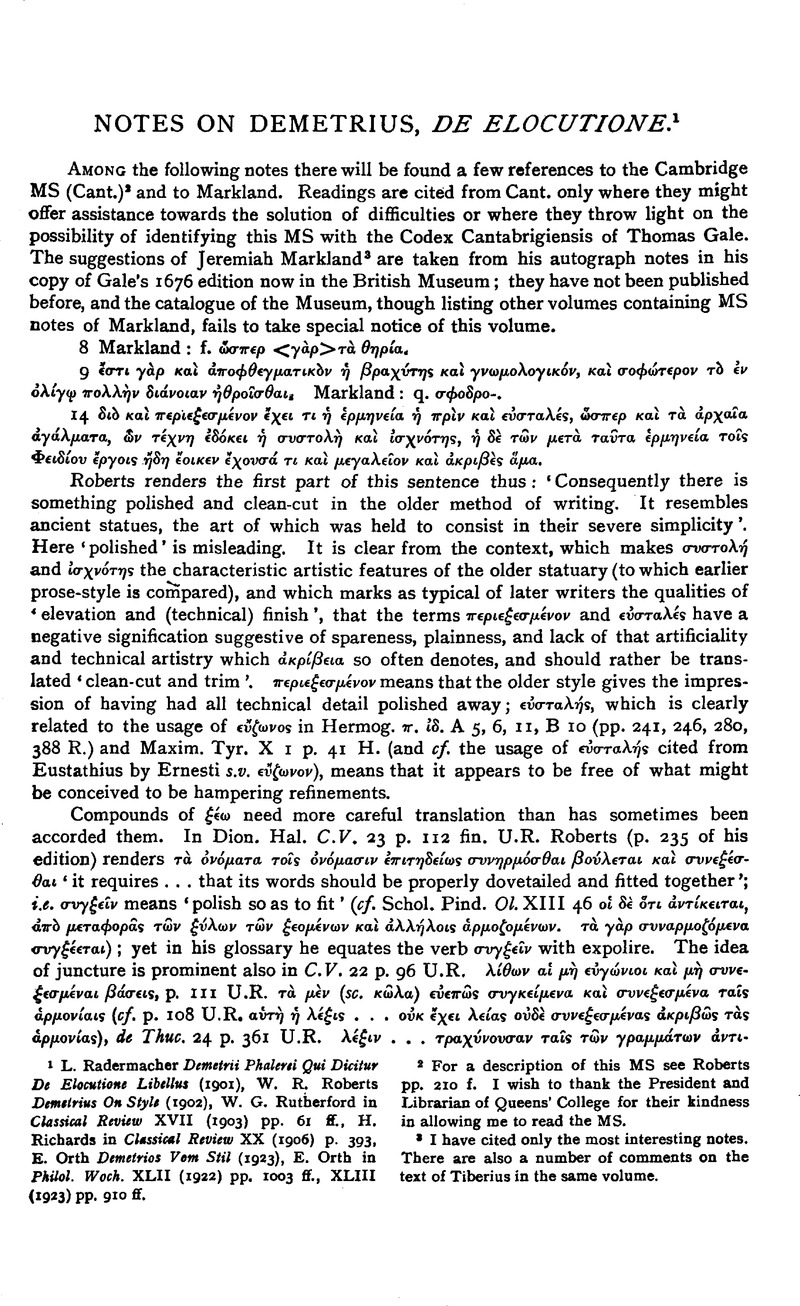No CrossRef data available.
Article contents
Notes on Demetrius, De Elocutione1
Published online by Cambridge University Press: 11 February 2009
Abstract

- Type
- Other
- Information
- Copyright
- Copyright © The Classical Association 1939
References
page 41 note 2 For a description of this MS see Roberts pp. 210 f. I wish to thank the President and Librarian of Queens' College for their kindness in allowing me to read the MS.
page 41 note 3 I have cited only the most interesting notes. There are also a number of comments on the text of Tiberius in the same volume.
page 42 note 1 Richards notes also the use of the term with reference to the Greek Romances (cf. Rohde, , Der griechische Roman p. 350Google Scholar).
page 45 note 1 In C.Q. XXXII (1938) p. 108 n.3Google ScholarProfessorPowell, J.E., with little relevance to his theme, makes a lively attack on some brief notes of mine which appeared in C.R. LI (1937) pp. 164 ffGoogle Scholar. Let me, with even greater irrelevance, make a word of reply. The belief (which he strives to ascribe to me) in the probability of a close relationship between MSS fortuitously assembled in a library is one that should not be attributed by any responsible scholar to another. A more careful reading of the latter half of my article would have made it clear that it aimed only at showing the faultiness of the distinction drawn by the anonymous writer of teh note attached to Brit. Mus. Add. 12182, viz. ‘In the Plutus its readings generally coincide with the Harl. MS. 6307 and in the Nubes with Harl. 5725’.
page 45 note 2 Mayser, E., Gramm. d. griech. Pap. aus d. Ptolemäerzeit II 3 p. 84Google Scholar, cites a curious use of καθ (= παρ τ) with the infinitive, which L.S.9 does not mention.
page 46 note 1 So Radermacher. Roberts cites παγγλη from P.
page 46 note 2 L.S.' cites no instances of δτοχζεδθαι followed by a dependent question, for which see Hippocr, . de Med. 7 (CMG I 1 p. 23)Google Scholar, Arist, . Rhet. II 21 p. 1395b 10Google Scholar, Galen, in Hippocr. de Nat. Hom. XV p. 101Google Scholar, K. (CGM V 9, 1 p. 53)Google Scholarin Hippocr. de Vict. Acut. XV p. 519 fir. , K. (CGM V 9, 1 p. 165)Google Scholar, Himer, , Orat, XX 7Google Scholar, Olympiod, , in Plat. Gorg. XIV 1 p. 72 N.Google Scholar, Schol. Hom. Od. I 433, Schol. Aristoph. Thesm. I 151 Dind.
page 47 note 1 A few corrections can be made of the history of the words listed by Roberts on p. 56, ‘none of them being found (in extant documents) earlier than Alexandrian, and some not earlier than Graeco-Roman times’. Delete γνωμολογικóς. δυσκοος, κινδυνώδης, κυκλοειδς (see Mayser, op. cit. I p. 478Google Scholar), λεκανς. Add πιøωνηματικς 109. From the list of π. εἰρ. on p. 57 delete δολεσχτερος, δὐναστις, μετασυντӨημι. Some of his notes may be supplemented: πλοϊκς (Philo, Lucian, etc.) adv. in Dion. Hal., σημεωτος (Philo, and an inscription of Roman times) Philod., γειτνν (the π. ρμ. shares this use with Aristotle, Rhet. I 9, 30')Google Scholar Dion. Hal. de Thuc. 3 p. 328. 13 U.R., Schol. Hom, Il. XX 67 (Vol. IV p. 233. 18 D.) [Alciphro I 3.3 has τν πρς Өνατον γειτνασιν. L.S.9 cites no example of γειτνασις or γειτνιω with a prepositional Phrase], σιαπαζειν (Josephus, Plutarch, Diog, Laert., etc.) Philod, κατερν (Strabo, Plut., etc.) Agatharc., λιӨοβοξȋν (LXX, N.T., Plut., etc.) μεταμορøοȗν (Philo, N.T., Lucian, etc.) Diod. Sic., λοκληρα (LXX, Plut., Diog. Laert., Lucian) Chrysippus, νειδιστικς (‘the adverb and adjective are late—Lucian, Marcus Aurelius, Hermogenes, Chrysostom, etc.’) adj. in Diod. Sic., προκταρκτικς (Plut., etc.) Chrysippus.




